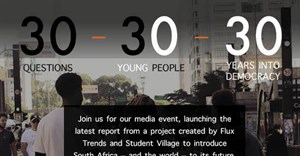Trending
#YouthMonth: Seven tips for minding the gap with Afrillennials
This according to Richard Mulholland, founder of Missing Link and speaker at Y!Con 2016:
Here’s our take on what he had to say about the elusive millennial market.
The world has been lying to you
Afrillennials shouldn’t be a significant cohort as they were not defined by any significant historical event like the Maturists (born pre-1945), Babyboomers (born pre-1960) or even Generation X (born pre-1980). These young adults face no significant wars, fixed gender roles or post-war booming. He’s not saying that they do not exist, but rather that having young adults in this era alongside evolution is nothing new and special treatment of this generation is not needed.
There is no new world of work
Graduates appear to have an insatiable appetite to reshape the world of work as we know it, but that shouldn’t dictate reality. People used to work for different purposes like home ownership and job security whereas now graduates seek work-life balance and even flexibility, but this is not new. Students want what the world has been working towards. It’s a multi-generational desire that increases as life gets busier and more complex.
You don’t need a hipster workforce
You don’t need to hire the hipsters of the world to ensure your business moves forward and you don’t need to change your brand to fit one generation. There are simple adjustments to make to ensure attraction and retention of the right young talent, however the benefits companies offer are a privilege, not a necessity. Attracting and retaining the very best candidates? Now that requires a bit more exertion, and in this instance Google makes a good example.
Their dreams are manageable
Younger generations have entered businesses for years with big ideas, hopes and dreams. They’ve also managed to make their picture fit within the puzzle of work life. Employees get paid a salary to do their jobs and it’s the norm to use the rest of one’s time to reach other personal goals beyond a career. Doing only what we love is not a reality that pays. Businesses and Afrillennials need to be realistic and manage one another’s expectations.
They need a shot
People have spent their lives working towards work-life balance and graduates entering the workplace feel entitled to ask for this benefit because they see that prior generations are achieving this ideal. This is just one of the perks in the limelight today. It’s not a requirement that new generations reap the benefits of what other generations worked tirelessly for, but rather that they are granted the opportunity to work toward shaping their ideal world of work.
They’re always growing
South Africans express often how annoyed they are by their younger colleagues that think they know better. It’s true that Afrillennials think they can do things better than the older generations, but only because they can create better methods and techniques in order to do things easier and faster. It’s human nature to find problems and then create solutions in order to work towards improvement. Afrillennials do however need insight, guidance and practical experience to grow, which only prior generations can offer.
Tech disruption has been happening
Technology seems to be a common solution to many issues in the workplace. The easiest way to resolve spending too much time or money on resources is to automate a process. We hate to break it to you but people have been implementing and surviving tech disruption for years, backdating to the time people used mathematicians to calculate their day’s takings, to today having calculators to do just that and more. Graduates are practically glued to their phones and other technologies because it’s what they’ve been exposed to and it’s where they are led by brands every day.
A fresh perspective
In the words of Douglas Adams, anything that is in the world when you are born is normal and ordinary and is just a natural part of how the world works. Anything that’s invented between the ages of 15 and 35 is new, exciting and revolutionary and you can probably get a career in it. Anything invented after you’re 35 is against the natural order of things.
Businesses should embrace graduates as part of the natural order of workplace growth and development, without feeling intimidated by the fact that they are bringing new ideas and attitudes into the workplace. A business isn’t defined by its success alone, but how the business has improved society, including the lives of its employees and the legacy it leaves for generations to come.
Source: Student Village
Student Village has carved its niche in youth insights and specialisation, youth research, graduate development and campus marketing. Reaching over a million students, you need to look no further than Student Village for the latest youth insights from what’s happening on the ground, to real issues that touch the youth of SA Student Village has over 15 years’ experience in understanding students as well as taking big brands to the youth market.
Go to: http://studentvillage.co.za/

















